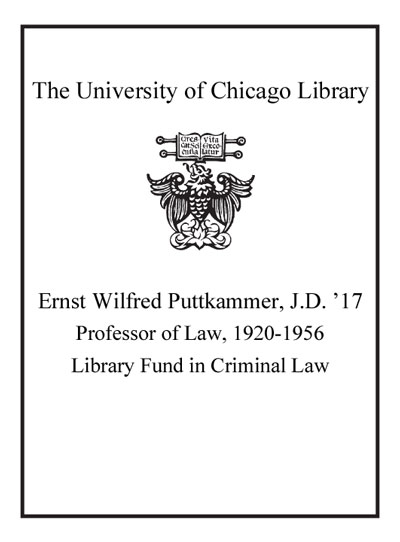Sentencing policy and social justice /
Saved in:
| Author / Creator: | Henham, Ralph J., 1949- author. |
|---|---|
| Edition: | First edition. |
| Imprint: | Oxford, United Kingdom : Oxford University Press, 2018. ©2018 |
| Description: | xi, 308 pages ; 23 cm. |
| Language: | English |
| Series: | Clarendon studies in criminology Clarendon studies in criminology. |
| Subject: | |
| Format: | Print Book |
| URL for this record: | http://pi.lib.uchicago.edu/1001/cat/bib/11445462 |
Table of Contents:
- Introduction
- Rationale and Scope
- Summary of the Argument
- The Structure of the Book
- 2. Sentencing Policy and Changing Notions of Social Justice
- Introduction
- Punishment and the Relationship between Citizen and State
- Justice and Social Context
- The Social Reality of Sentencing Policy and Social Justice
- The Relationship between Rights, Norms, and Ethics
- The State's Duty to Promote Social Justice through Sentencing
- The Politics of Sentencing and the Relevance of Social Values
- Social Justice and the Sentencing of Irregular Migrants
- 2. Sentencing Policy as a Force for Social Cohesion
- Introduction
- Conceptualizing Sentencing as a Normative Function
- Problems of Relating Social Values to Sentencing
- Sentencing Policy in a Fragmented Society
- Lessons from the English Riots of 2011
- 3. The Relevance of Globalization and Notions of Transition
- Introduction
- The Impact of Globalization on Sentencing Policy
- Problems of Comparison and Policy Transfer in Sentencing
- Recognizing the Relativity of Value
- Sentencing and the Notion of Transition
- Social Values and the Sentencing of Financial Crime
- 4. Engaging Sensibilities and the Common Good
- Introduction
- Sentencing as Therapy
- Public Perceptions of Sentencing
- Sentencing Policy and the Common Good
- Conclusion and Implications
- 5. Bridging the Gap between Political and Penal Legitimacy
- Introduction
- The Legitimacy of Sentencing and the Political Economy
- Achieving Greater Recognition for Social Justice in Sentencing
- Communitarian Values and the Politics of Sentencing
- Social Justice and the Sentencing of Women
- 6. Establishing New Foundations and Structures for Governance
- Introduction
- Recasting the Moral Values that Inform Penal Ideology
- The Implications for Sentencing Research
- The Impact on Criminal Justice Governance
- Problems of Moving from Theory to Practice
- The Role of Judicial Discretion
- Prioritizing Substantive Justice
- Countering the Secularization of Justice Delivery
- 7. Some Practical Implications for Policy and Practice
- Introduction
- Strategies for Achieving Practical Reform
- Reflecting Social Value
- A Publicly Justifiable Framework of Penal Objectives
- Developing a Workable Test of Social Value
- Developing an Integrated Sentencing Framework
- 8. Conclusion
- The Case for Change
- The Implications for Sentencing Policy
- Enhancing the Moral Credibility of Sentencing
- Promoting Social Justice as a Realistic Objective
- Strategies for Developing Judicial Discretionary Power
- Restoring Public Confidence and Trust in Discretionary Justice
- Concluding Comments
- References
- Index

